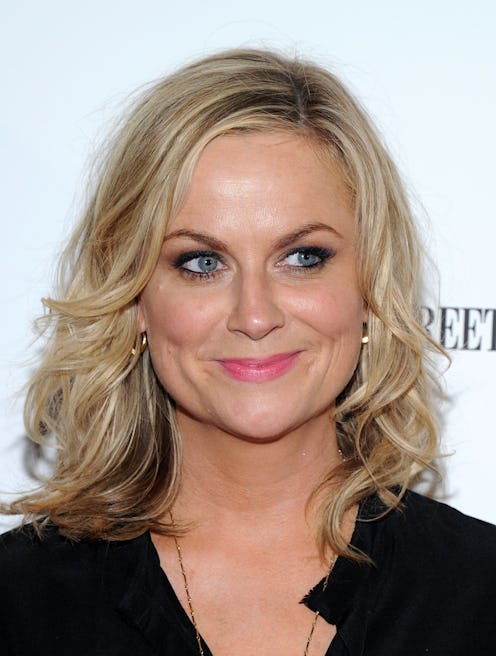Entertainment
Amy Poehler Is Fighting For Your Right To Fail

Amy Poehler is at the top of the comedic food chain. It's hard to dispute that the 45-year-old comic-actor-author-activist-director-producer-screenwriter is not the queen of her many domains. Her professional successes would encompass an embarrassingly lengthy resume, and I'm aware of such when I sit down with Poehler, who's promoting her latest, The House, in a sun-soaked Beverly Hills hotel room during the third weekend of June. All of these accomplishments and accolades might have turned other actors into stony or magniloquent non-humans, but not Poehler. She kicks off her shoes, offers me a seat at a circular table, and unveils a wide, warm smile that instantly welcomes me to the conversation. I feel at ease, but still a bit intimidated: this is a woman who, from an outsider's perspective, seemingly never fails. Yet my interview subject is quick to rebute this idea. In fact, Poehler is fighting for womens' right to fail.
"I would love to fight for a woman's ability — a woman's right — to succeed and fail over and over again like men do," she says. "In this business, I believe there is a lot of added pressure put on some female directors who helm big projects or female writers who have to represent all female voices."
Poehler, who has been dubbed by the internet time and time again as a modern feminist icon — thanks in part to her role as Parks and Recreation's Leslie Knope and her creation of Amy Poehler's Smart Girls — has, in a way, been tasked with speaking for the female masses. This is a role she feels the weight of.
"It's a compliment, and I hope it means that I’m trying to give voices and opportunity to a bunch of different women. But I also do know that my version of feminism isn’t always somebody else's," she says. "Women are all so different, and I would never assume I'm representing everybody's voice. I'm a white lady. I have to be very aware of the privilege that I have and be sensitive to how to wield that currency."
As a woman with a platform, Poehler feels "a certain amount of extra pressure," that she might not face to such an acute degree if she wasn't in the public eye. And this could make failing — in the words many iterations — more difficult. "For example, when I do press days, I’m always asked about other women comedians. I’m happy to talk about my peers, and I love talking about other women I respect," she says. "But men are not asked about each other. They don’t group [men] all together. They’re all individually allowed to be in their own space."
And, as Poehler pointed out, successful men are seemingly allowed to fail, and recover from failure publicly, more so than successful women. Given that there are so few women allowed a seat at the Hollywood table as it is, when a woman is invited to join, the bar for what she is expected to accomplish is surely raised exponentially.
One (albeit, fictional) woman who also feels the constant pressure of the patriarchy is glass-half-full Leslie Knope, played by Poehler for seven seasons on NBC's Parks and Recreation. "Leslie Knope is a hero of mine. I would love to be like like Leslie Knope, who is indefatigable in the face of rejection and who really believes in the best in people, and who isn’t discouraged by cynicism," she says, her face lighting up as she speaks to the beloved character. "I wish I could have that. But I’m a flesh and blood person and Leslie lives in the TV box."
Knope's optimism is encouraging — but sustainably unrealistic. The hard truth is, women are facing even greater barriers in 2017 than in recent years, and the reason is screamingly obvious. "There’s a silver lining over these past six months, post-election, and that's [that] a lot of different women are coming together, talking about how they can work together, even though maybe they don’t always agree," Poehler says. "There’s been a fire lit under a lot of women who are really, really fed up and tired of the same bullsh*t all the time. There's a shared sense of fatigue."
This added opposition from the presidency makes it even harder for women to feel comfortable failing. Who has the luxury of failure when there's an entire patriarchy to fight? "I think the tide is turning slowly, and I understand the frustration about how slow it feels," Poehler says. "My goal this year has been to talk less and listen more."
For Poehler, who has a wide audience of women, men, girls and boys, looking towards her for guidance, her goal is a peculiar one. But as Poehler fights for her fans' (and her fellow creatives') right to fail, it makes a lot of sense. It's as if she's saying: Go ahead, try something bold, suck at it, because at the end of the day Poehler will be there to listen — and support you in all the ways you might fail.